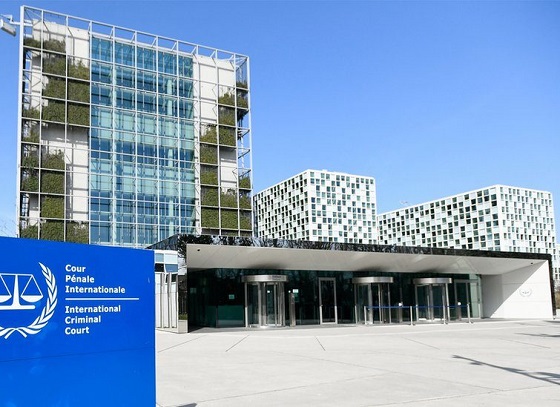Frontier Centre for Public Policy
False Claims, Real Consequences: The ICC Referrals That Damaged Canada’s Reputation

From the Frontier Centre for Public Policy
By Nina Green
The University of Manitoba has not provided the name of a single Indian residential school student who went missing and whose parents did not know at the time what had happened to their child. Not one.
Why has Canada twice been referred to the International Criminal Court on the basis of false claims about Indian residential schools?
The answer is simple.
The ultimate cause is the University of Manitoba’s National Student Memorial which falsely claims that it is a list of students who died on the premises of Indian residential schools and students who went missing from Indian residential schools. The University of Manitoba site tells users to:
Click on a region below to see a list of residential schools. Each residential school page contains a list of students who died or went missing at that school.
Those claims by the University of Manitoba are not true.
Firstly, the majority of the 4139 students currently on the University of Manitoba’s Student Memorial Register did not die on the premises of an Indian residential school. Most died elsewhere, as established by the Truth and Reconciliation Commission report entitled Missing Children and Unmarked Burials, which is in Table 4. Location of residential school deaths, 1867–2000 on page 21 states that only 423 named students died on the premises of an Indian residential school over the course of 133 years, an average of 3 students a year.
Thus, the majority of students did not die on the premises of Indian residential schools. They died elsewhere – in public hospitals or of illness or accidents on their home reserves, accidents which included house fires, drownings, gunshot wounds, vehicle accidents, falling trees, being hit by trains, and other accidental deaths, as established in hundreds of provincial death certificates.
Secondly, none of the students on the University of Manitoba’s lists went missing from an Indian residential school. To date, the University of Manitoba has not provided the name of a single Indian residential school student who went missing and whose parents did not know at the time what had happened to their child. Not one. And far from being ‘missing’, in fact hundreds of provincial death certificates establish that the students were buried on their home reserves by their families and communities.
Based on the University of Manitoba’s misleading lists, the media and the federal government uncritically accepted the false claim by the Kamloops Band on 27 May 2021 that the Band had discovered ‘the remains of 215 children’. After three years, the Band downgraded that false claim on 18 May 2024 to the claim that it had merely discovered ‘215 anomalies’, which could be anything, and are almost certainly the remains of the 2000 linear feet of trenches of a septic field installed in 1924 to dispose of the school’s sewage.
The first referral to the International Criminal Court by a group of 22 lawyers
Only a few days after the Kamloops Band made its false claim, on 3 June 2021 a group of 22 lawyers sent a 14-page complaint to the ICC requesting the Prosecutor to initiate an investigation of a ‘mass grave’ of Indian residential school students which had been discovered at Kamloops. The claim by the 22 lawyers that a ‘mass grave’ had been discovered at Kamloops was, of course, false.
The International Criminal Court quickly declined jurisdiction in November 2021, and on 13 September 2022 Dr Chile Eboe-Osuji, former President and Judge of the International Criminal Court, informed Special Interlocutor Kimberly Murray and those present at her National Gathering in Edmonton of the reasons for doing so. As reported by Chief Derek Nepinak, Dr Eboe-Osuji stated unequivocally that:
There is no pathway to the International Criminal Court for the situation of the historical Indian residential school system in Canada.
Dr Eboe-Osuji’s presentation has never been made available on the Special Interlocutor’s website, and requests to both Kimberly Murray and Dr Eboe-Osuji for a copy of his presentation have gone unanswered.
The second referral to the International Criminal Court by Special Interlocutor Kimberly Murray
Undeterred by the ICC’s refusal to accept jurisdiction and the reasons offered by Dr Eboe-Osuji in his presentation to her 13 September 2022 National Gathering, Kimberly Murray pursued the issue based on the University of Manitoba’s lists falsely claiming that all the students on its lists died on the premises of specific Indian residential schools or went missing from those schools.
On 29 October 2024, Kimberly Murray delivered her final report to Minister of Justice Arif Virani. However, as she told the Senate Standing Committee on Indigenous Peoples on 27 November 2024, Kimberly Murray also sent her report to the International Criminal Court, requesting Canada’s prosecution by the Court.
How the ICC will react to Kimberly Murray’s referral of Canada for prosecution is as yet unknown.
Damage to Canada’s international reputation
Canada’s reputation has been irreparably damaged by these two referrals to the International Criminal Court based on the University of Manitoba’s National Student Memorial which falsely claims that it is a list of students who died on the premises of specific residential schools or went missing from those specific schools.
It cannot be reiterated often enough:
(1) that most students whose names are on the University of Manitoba’s National Student Memorial did not die on the premises of a residential school;
(2) that most students on the University of Manitoba’s National Student Memorial died in public hospitals or of illness and accidents on their home reserves;
(3) that the University of Manitoba has never provided the name of a single student who ever went missing from an Indian residential school whose parents didn’t know what happened to their child; and
(4) that the majority of students whose names are on the University of Manitoba’s National Student Memorial were buried by their families and communities on their home reserves. Over time, their families and communities have forgotten them, and through neglect of the grave markers, no longer know where in their reserve cemeteries they are buried.
The University of Manitoba’s National Student Memorial has misled Canadians and has resulted in two referrals of Canada for prosecution by the International Criminal Court based on false claims about ‘mass graves’ and ‘missing’ and ‘disappeared’ Indian residential school students.
The federal government and the Catholic Church must demand that the University of Manitoba take down its false and misleading National Student Memorial.
Nina Green is an independent researcher who lives in British Columbia.
Alberta
Too Graphic For A Press Conference But Fine For Kids In School?

From the Frontier Centre for Public Policy
By Lee Harding
Alberta moves to remove books after disturbing content, too graphic for media to view, was found in schools
Should elementary school children be given books to read with harsh insults against minorities, depictions of oral sex, and other disturbingly graphic and explicit content?
Such books have been in some Alberta elementary schools for a while, and in many school libraries across Canada.
In late May, the Alberta government announced it would establish new guidelines regarding age-appropriate materials in its schools. A government press release included quotes with disturbing content, but at a press conference, Education Minister Demetrios Nicolaides said some book illustrations could not be shown.
“I would show these images to all of you here and to the media, but they are too graphic for a live-stream media event. These examples … illustrate the kind of content that raises concerns amongst parents,” Nicolaides said.
You don’t say? This seems like the sort of stuff no one, except a pervert in a park, would dream of showing to a child. Ironically, the inability to publicize such graphic materials is part of the reason they have been shown to children with little public awareness.
Citizens’ group Action4Canada (A4C) has claimed its activism played a pivotal role in the Alberta decision. The organization has compiled a 36-page document online with examples of objectionable content in Canadian schools. Among the worst is Identical by Ellen Hopkins, which includes graphic descriptions of a little girl being molested by her father.
A4C founder Tanya Gaw has repeatedly tried to raise concerns about objectionable books with school boards, often without success. In some cases, she isn’t even allowed on the agenda if she states her topic upfront. When she is permitted to speak, she’s frequently cut off as soon as she begins quoting from the books, preventing the content from entering the public record.
In January 2023, Gaw made an online presentation to a school board in Mission, B.C. regarding materials in their schools. As she began to screenshare what was there, some board members objected, saying such permission had not been given in advance.
One month later, the board banned Action4Canada from making any further presentations. In later media interviews, the board chair justified the decision by saying Gaw’s PowerPoint contained some graphic and “inappropriate images.”
Exactly, and that is the problem. A recent check showed Mission’s school division only removed four of 15 books A4C objected to. Gaw is just glad “Identical” is one of them.
Pierre Barns, a father from Abbotsford, B.C., made it his mission to notify school boards across Canada what was on their school shelves. An online search was all it took to confirm. A “reply all” from a board member at the Halton School District in Ontario was most ironic.
“I am concerned. This individual has included links to publications and videos which may contain illegal content,” she wrote.
“I’m not sure how to investigate the content of the email safely. Would you please advise us whether or not this person ought to be reported to police? Is there some action we should take?”
There probably was action they should have taken, such as removing the books, but that never happened. Later, they defended a biologically male teacher in their school division who made international headlines by wearing large prosthetic breasts to school.
The Alberta government has committed to conducting public consultations before implementing new policies. It’s a good time for parents and citizens there and in other provinces to speak up. A young mind is a terrible thing to corrupt, but unfortunately, some schools are part of this corrosive effort.
Lee Harding is a research fellow with the Frontier Centre for Public Policy.
Economy
Canada Treats Energy As A Liability. The World Sees It As Power

From the Frontier Institute for Public Policy
Research VP Marco Navarro-Genie warns that Canada’s future hinges on building energy infrastructure, not just expanding pipelines but forging a true North American energy alliance. With global demand rising and authoritarian regimes weaponizing energy, Ottawa’s dithering costs Canada $70 million daily. Sovereignty isn’t secured by speeches but by infrastructure. Until Canada sheds its regulatory paralysis, it will remain a discount supplier in a high stakes geopolitical game. Time to build.
Canada has energy the world is begging for, but ideology and red tape are holding us back
As Prime Minister Mark Carney met with U.S. President Donald Trump recently, energy should have been the issue behind every headline, whether mentioned or not. Canada’s future as a sovereign, economically resilient country will depend in no small part on whether the country seizes this moment or stalls out again in a fog of regulatory inertia and political ambivalence. Canada holds an underleveraged strategic card: the potential to be the world’s most reliable democratic energy supplier. Recent trade figures show Chinese imports of Canadian crude hit a record 7.3 million barrels in March, a direct result of newly expanded access to the Pacific via the Trans Mountain Expansion (TMX), a federally owned pipeline project that now connects Alberta crude to global markets through British Columbia’s coast. But one pipeline does not make a national strategy. Demand in Asia is growing fast. India is among the hungriest, but Canada’s infrastructure is nowhere near meeting that demand.
This matters not just for Canada, but for the United States as well. In a world where energy markets are weaponized and strategic reserves manipulated by authoritarian regimes, the case for a coordinated North American energy alliance is stronger than ever. Such an alliance should not erode national sovereignty. It should reinforce it, allowing Canada, the U.S. and Mexico to insulate themselves collectively from supply shocks and geopolitical blackmail while projecting democratic strength abroad.
But for that alliance to work, Canada must be a credible partner, not merely a junior supplier shackled by Ottawa-induced internal bottlenecks. While the U.S. has leveraged its shale revolution, LNG capacity and permitting reforms to pursue energy dominance, Canada dithers. Projects languish. Investment flees. And meanwhile, Canadian oil continues to flow south at a steep discount, only to be refined and resold, often back to us or our trading partners, at full global prices.

Yes, you read that right. Canada’s oil and gas is sold at a discount to U.S. customers, and that discount costs Canada more than $70 million every single day. The Frontier Centre for Public Policy has developed a real-time tracker to monitor these losses. This pricing gap exists because Canada lacks sufficient pipeline infrastructure to access overseas buyers directly, forcing producers to sell to the U.S., often at below-market rates.
Such massive losses should be unacceptable to any government serious about economic growth, geopolitical influence or environmental integrity. Yet Ottawa continues to speak the language of ambition while legislating the mechanics of paralysis. Stephen Guilbault’s statement that Canada already has enough pipelines speaks to more paralysis..
Canada’s energy infrastructure challenges are not just economic; they are matters of national defence. No country can claim to be secure while relying on another’s pipelines to transport its energy across its own territory. No country can afford to leave its wealth-producing regions boxed in by regulatory choke points or political resistance dressed as environmental virtue.
Our energy economy is fragmented. Western hydrocarbons are stuck inland and must pass through the U.S. to reach Eastern Canada or global markets eastward. This weakens national unity and leaves us exposed to foreign leverage. It also creates strategic vulnerabilities for our allies. American industries depend on Canadian crude. So do U.S. Gulf Coast refineries. And while American officials continue to treat energy as a tool of diplomacy and economic leverage, using energy exports to build alliances and reduce reliance on unstable regimes, Canada treats it as a domestic liability.
We need to shift the frame. Infrastructure isn’t just about steel in the ground; it’s the backbone of strategic autonomy. Pipelines, export terminals and utility corridors would allow Canada to claim its place in the emerging geopolitical order. They would also signal to global investors that Canada is open for business and capable of delivering returns without political obstruction.
The U.S. wants a stable, competent partner to help meet global energy needs. Increasingly, so does the rest of the world. But until we address our internal dysfunction and build, we’re stuck. Stuck watching global opportunities pass us by. Stuck selling low while others sell high. Stuck in a conversation about sovereignty we’re not structurally equipped to address, let alone win.
When Carney meets with Trump again, he would do well to remember that economic independence, not rhetorical unity, is the bedrock of sovereignty. Without infrastructure, Canada brings only words to a hard-power conversation.
Paraphrasing Thomas Hobbes, energy covenants without infrastructure are but words. It’s time to stop posturing and start building.
Marco Navarro-Genie is the vice-president of research at the Frontier Centre for Public Policy. He is co-author, with Barry Cooper, of Canada’s COVID: The Story of a Pandemic Moral Panic (2023).
-

 Alberta1 day ago
Alberta1 day agoAlberta’s grand bargain with Canada includes a new pipeline to Prince Rupert
-

 Bruce Dowbiggin14 hours ago
Bruce Dowbiggin14 hours agoWOKE NBA Stars Seems Natural For CDN Advertisers. Why Won’t They Bite?
-

 Business1 day ago
Business1 day agoCarney’s European pivot could quietly reshape Canada’s sovereignty
-

 Energy15 hours ago
Energy15 hours agoCould the G7 Summit in Alberta be a historic moment for Canadian energy?
-

 Crime2 days ago
Crime2 days agoManhunt on for suspect in shooting deaths of Minnesota House speaker, husband
-

 Crime14 hours ago
Crime14 hours agoMinnesota shooter arrested after 48-hour manhunt
-

 conflict8 hours ago
conflict8 hours agoIsrael bombs Iranian state TV while live on air
-

 Aristotle Foundation12 hours ago
Aristotle Foundation12 hours agoThe Canadian Medical Association’s inexplicable stance on pediatric gender medicine



